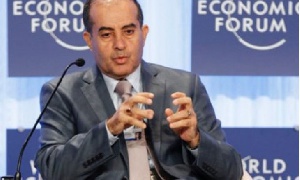 Former Libyan Prime Minister, Mahmoud Jibril
Former Libyan Prime Minister, Mahmoud Jibril
When Mahmoud Jibril stood in Libya’s free elections in 2012 after heading the rebel government that helped overthrow Muammar Gaddafi in 2011, many believed that he could unify the country. Libya, which had then just emerged from a brutal conflict, needed to get back on its feet and Jibril’s supporters felt he was the right man to help steer affairs of the country.
But others were not so enthused about him, considering he had links with Gaddafi. Jibril was an economic advisor to the Gaddafi government in its last years before he joined the revolution in 2011. A few weeks after the uprising began, Jibril was made head of the rebel National Transitional Council (NTC), the interim government that eventually ousted and killed Gaddafi.
Jibril would toward the end of the conflict become the man of the moment in Libya, with his government recognized as the “sole legitimate representative” of Libya by UN states including France, the United Kingdom, the United States, Turkey, and Iran. Indeed, he fulfilled his promise to resign as interim prime minister for the NTC after “Libya’s liberation.”
Becoming the head of the National Forces Alliance, one of the largest political parties in Libya, Jibril contested in the 2012 democratic elections. His party did win the vote but did not grab a majority in parliament. Parliament then chose an independent candidate to become prime minister. Violence broke out again in Libya in subsequent years, and Jibril was forced to leave the country to abroad. Not much was heard from the Libyan leader until this April when his party confirmed that he had died of the coronavirus. The 68-year-old died in Cairo where he had been hospitalized for two weeks after suffering from cardiac arrest. Three days later, he tested positive for coronavirus.
Born in 1952, Jibril graduated in Economics and Political Science from Cairo University in 1975 before earning a master’s degree in political science and a Ph.D. in strategic planning and decision-making from the University of Pittsburgh in Pennsylvania. He then taught strategic planning and decision-making at the university for many years and was behind many leadership training programs in several Arab states.
Jibril did write many books and also served as the head of the Libyan National Planning Council. By 2009, he was working with the Gaddafi government as chairman of the National Economic Development Board (NEDB), which was created to stir up investment in Libya. But by the start of 2011, Jibril had defected to the rebel National Transitional Council after engaging in a project aimed at establishing a democratic state.
Gaddafi, who came to power in a coup in 1969 before he was toppled, was criticized by some for ruling with an iron fist and being a dictator. On October 20, 2011, he was ousted following an international military intervention led by France, the United States and Britain. The revolutionary and politician was rounded up by rebels at his hideout and subsequently killed.
Jibril, while heading the interim government during the Libyan uprising, “made several trips abroad to rally European and US support for the rebels against Gaddafi,” Aljazeera reported. Three months before the killing of Gaddafi, Jibril called for unity amid the Battle of Tripoli while asking the police and the army to disown Gaddafi. “Today, all Libya’s people are allowed to participate in the building of the future to build institutions with the aid of a constitution that does not differentiate between a man and a woman, sects or ethnicities. Libya is for everyone and will now be for everyone. Libya has the right to create an example that will be followed in the Arab region,” he said on August 21.
Days after Gaddafi’s death, Jibril told the BBC that he wanted him alive. He said he had wanted to ask the former leader why Libya had to live for 42 years under oppression.
Many Libyans celebrated the humiliating end of Gaddafi with hope for a better future. Nine years on, the oil-rich nation is still in chaos as it is split between a UN-recognized government in the capital, Tripoli, and rival leaders in the east. For several years, the United Nations and western countries have been making attempts to hold elections in Libya to help resolve the political tensions between the two governments. The United Nations-backed Government of National Accord based in Tripoli and led by Prime Minister Fayez al-Sarraj said in March that Libya would hold presidential and parliamentary elections this year.
But these efforts were ruined after Khalifa Haftar, the leader of the Libyan National Army (LNA) forces ruling eastern Libya from Benghazi, launched an offensive to take the capital in April. Haftar’s LNA, not recognizing the unity government, launched an attack on Tripoli after taking over the oil-rich south of Libya before advancing through largely unpopulated desert regions toward the capital.
Haftar had received backing from countries like France, Egypt, the UAE, and, of course, Russia where he regularly visited. When he tried to seize Tripoli, military support from Turkey helped government forces drive his troops back from the frontlines.
Last month, the United Nations reported that Libya’s rivals have reached an agreement during a political forum to hold presidential and parliamentary elections on December 24, 2021. It said they also agreed to name a volunteer legal committee to work on the “constitutional basis for the election”.